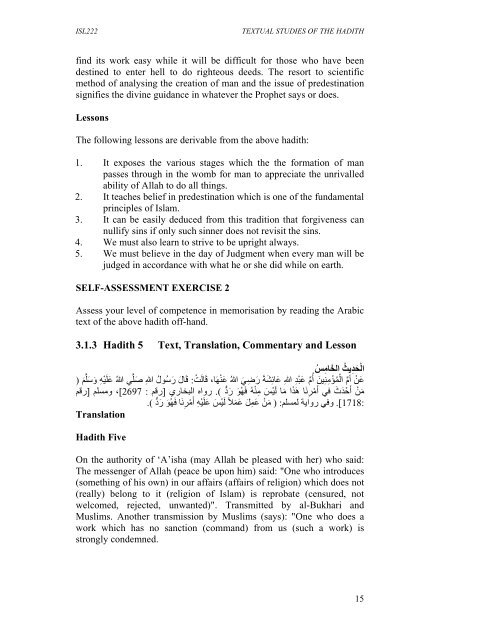Textual Studies of the Hadith - National Open University of Nigeria
Textual Studies of the Hadith - National Open University of Nigeria
Textual Studies of the Hadith - National Open University of Nigeria
Create successful ePaper yourself
Turn your PDF publications into a flip-book with our unique Google optimized e-Paper software.
ISL222 TEXTUAL STUDIES OF THE HADITH<br />
find its work easy while it will be difficult for those who have been<br />
destined to enter hell to do righteous deeds. The resort to scientific<br />
method <strong>of</strong> analysing <strong>the</strong> creation <strong>of</strong> man and <strong>the</strong> issue <strong>of</strong> predestination<br />
signifies <strong>the</strong> divine guidance in whatever <strong>the</strong> Prophet says or does.<br />
Lessons<br />
The following lessons are derivable from <strong>the</strong> above hadith:<br />
1. It exposes <strong>the</strong> various stages which <strong>the</strong> <strong>the</strong> formation <strong>of</strong> man<br />
passes through in <strong>the</strong> womb for man to appreciate <strong>the</strong> unrivalled<br />
ability <strong>of</strong> Allah to do all things.<br />
2. It teaches belief in predestination which is one <strong>of</strong> <strong>the</strong> fundamental<br />
principles <strong>of</strong> Islam.<br />
3. It can be easily deduced from this tradition that forgiveness can<br />
nullify sins if only such sinner does not revisit <strong>the</strong> sins.<br />
4. We must also learn to strive to be upright always.<br />
5. We must believe in <strong>the</strong> day <strong>of</strong> Judgment when every man will be<br />
judged in accordance with what he or she did while on earth.<br />
SELF-ASSESSMENT EXERCISE 2<br />
Assess your level <strong>of</strong> competence in memorisation by reading <strong>the</strong> Arabic<br />
text <strong>of</strong> <strong>the</strong> above hadith <strong>of</strong>f-hand.<br />
3.1.3 <strong>Hadith</strong> 5 Text, Translation, Commentary and Lesson<br />
ُسِما َخلا ُثيِد َحْلا<br />
ْتَلاَق ،اَھْنَع ُﷲ َيِضَر َةَشِئاَع ِﷲ ِدْبَع ﱢمُ ) َمﱠلَسَو ِهْيَلَع ُﷲ يﱠلَص ِﷲ ُلوُسَر َلاَق :<br />
أ َنيِنِم ْؤُمْلا ﱢمأ ْنَع<br />
مقر]<br />
ملسمو<br />
،[<br />
2697 : مقر]<br />
يراخبلا هاور .( ﱡدَر َوُھَف ُهْنِم َسْيَل اَم اَذَھ اَنرْمَأ ِ يف َثَدْحَأ ْنَم<br />
.( ﱡدَر َوُھَف اَنِرْمَأ ِهْيَلَع َسْيَل ًلاَمَع َلِمَع ْنَم ) : ملسمل ةياور يفو .[ 1718:<br />
Translation<br />
<strong>Hadith</strong> Five<br />
On <strong>the</strong> authority <strong>of</strong> ‘A’isha (may Allah be pleased with her) who said:<br />
The messenger <strong>of</strong> Allah (peace be upon him) said: "One who introduces<br />
(something <strong>of</strong> his own) in our affairs (affairs <strong>of</strong> religion) which does not<br />
(really) belong to it (religion <strong>of</strong> Islam) is reprobate (censured, not<br />
welcomed, rejected, unwanted)". Transmitted by al-Bukhari and<br />
Muslims. Ano<strong>the</strong>r transmission by Muslims (says): "One who does a<br />
work which has no sanction (command) from us (such a work) is<br />
strongly condemned.<br />
15

















